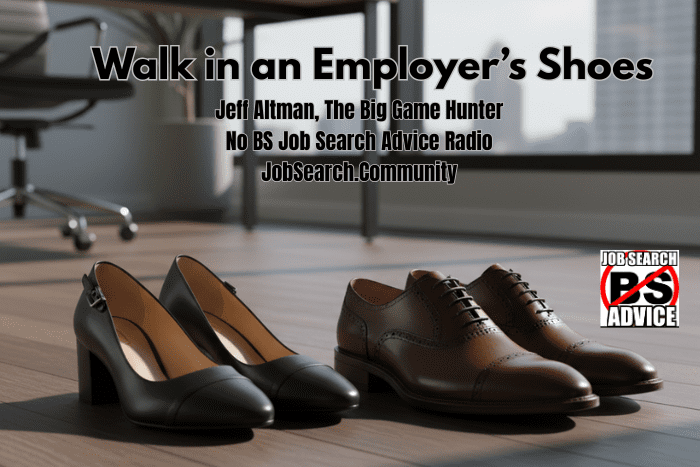By Jeff Altman, The Big Game Hunter
If you’re in the middle of a job search and your inbox remains quiet, it might be time to change your perspective. Instead of focusing only on what you need from a job, start thinking about what an employer truly needs from you. While it’s tempting to wish employers could experience the uncertainty and frustration job seekers endure today—from ghosting to algorithmic screening—the most strategic move is to step into their shoes first.
Understanding how employers think is about effectiveness, not empathy. Employers are under increasing pressure to make the right hire, minimize turnover, and maintain team morale in a complicated labor market. The more you can show that you understand their challenges, the more likely you are to stand out as a solution, not just an applicant.
What Keeps Hiring Managers Up at Night
1. Protecting Team Culture
Every leader today knows that one disengaged or disruptive employee can derail productivity and morale. Hybrid work arrangements, digital collaboration, and rapid organizational change make it even easier for a negative attitude to spread. Hiring managers fear bringing in someone who doesn’t align with team values. They want people who adapt, communicate, and add balance—especially in diverse or remote teams.
2. Reputation and Accountability
Hiring isn’t just a business function; it’s a reflection of the manager’s judgment. Many hiring leaders are evaluated on retention and performance metrics. A poor hiring decision can damage their credibility, slow down team deliverables, and create friction with HR or senior leadership. They must be confident that the person they choose will deliver results without micromanagement.
3. Customer and Brand Impact
Employees represent the company’s brand, both in person and online. A negative social media post, an unprofessional client interaction, or a missed commitment can ripple quickly in today’s digital world. Employers are increasingly focused on professionalism, emotional intelligence, and authenticity when assessing candidates.
How to Build Employer Confidence Before the Interview
Research Like a Consultant
Generic preparation doesn’t cut it anymore. Go beyond the company’s “About” page. Review:
Press releases, LinkedIn updates, and annual reports.
Competitors and market shifts.
Employee reviews that reveal cultural themes and leadership style.
Then use what you learn to tailor your application materials. When you echo an employer’s current priorities—such as sustainability, digital transformation, being or customer experience—you demonstrate not only research skills but curiosity and alignment.
Upgrade Your Digital Resume and Presence
Your résumé, LinkedIn profile, and professional footprint often get evaluated by both humans and algorithms. Make sure they speak directly to the three things hiring managers crave: results, reliability, and fit.
Showcase measurable outcomes: “Increased client retention by 12%,” “Implemented automation that saved 10 weekly hours.”
Highlight collaboration: emphasize cross-functional work and adaptability.
Keep design professional and ATS-friendly. Simplicity and clarity win in 2025.
Ensure your LinkedIn activity aligns with your professional goals—your comments and posts reflect your reputation.
Bring a Positive, Growth-Oriented Mindset
Negativity kills trust. Hiring managers can sense frustration or desperation. Instead, frame challenges as lessons learned and emphasize ongoing development. If you’ve been upskilling through online courses, certifications, or volunteer work, mention it—it signals initiative and resilience.
How to Build Employer Confidence During the Interview
Lead With Curiosity
Ask thoughtful questions that reveal how you think about value, not just salary. One of the most effective questions remains: “Thinking about the person who was most successful in this role, what made them stand out?” This shows respect for the employer’s perspective and gives you a roadmap to connect your own experience directly to their needs.
Answer Directly—Then Expand
Avoid evasiveness. Nothing undermines trust faster than dodging questions. Listen carefully, address what’s asked, and then add context if appropriate. If you’re unsure or don’t have direct experience, be honest and pivot to how you’d handle a similar challenge.
Show Genuine Interest and Ownership
Many candidates end interviews without clearly signaling enthusiasm. Toward the end, confidently state your interest: “Ms. Rodriguez, I’m genuinely excited about this opportunity and believe my experience aligns with the goals you described. What are the next steps in your process?” That small moment of initiative demonstrates accountability and confidence—two traits hiring managers value highly.
How to Build Employer Confidence After the Interview
Send a Personalized Thank-You Message
Within 24 hours, send each interviewer a customized note (email is fine in 2025). Reference something specific from your conversation—an upcoming project, a shared value, or an organizational goal—and link it back to your strengths. If there was a concern during the interview, acknowledge it professionally and reinforce your ability to meet the challenge.
Follow Up Intentionally
Agree on a follow-up time during the interview—typically 7–10 days. When that time comes, send a concise, polite message reaffirming your interest and summarizing a key takeaway from your discussion. Consistent, professional follow-up demonstrates perseverance without appearing pushy.
The Mindset Shift: From Applicant to Asset
When you step into an employer’s world, you stop viewing the process as an audition and start approaching it as a collaboration. Employers aren’t searching for perfection—they’re searching for problem-solvers who help their teams succeed.
Look at every touchpoint of your job search—your résumé, your digital presence, your interview responses—as opportunities to answer an employer’s silent question: “Can I trust this person to make my job easier?”
I know some of you are saying, “OK, Boomer, I do this before every interview without results!” Great! I’ve affirmed you’re doing the right things. You’re doing something else wrong that is yielding no results, or the job market isn’t buying what you’re selling.”
However, walking in an employer’s shoes is a more effective strategy than whining. When you understand what drives their decisions, you elevate yours. That shift, from applicant to partner, is what turns a job search into a career opportunity.
Ⓒ The Big Game Hunter, Inc., Asheville, NC 2025

